How to Hire a Kubernetes Developer: an Outsource Guide for Founders

Key takeaways
- How to determine whether you need a software engineer or a DevOps specialist with knowledge of Kubernetes? Find out points that will help you identify which specialist your project requires.
- A Kubernetes specialist is quite a multi-faceted one. Explore our article to learn which skills such a professional should have and how they vary depending on the qualification level.
- How to hire Kubernetes experts in a risk-free way and establish a seamless workflow? Check our guide to learn all the tips and tricks.
- Check out tips from our Kubernetes specialists on how to conduct a tech interview and aspects to pay attention to spot a skilled Kubernetes expert.
Kubernetes is the type of technology that can bring numerous benefits but only to businesses that don’t simply follow the buzz but instead understand why they need it and what gaps they plan to fill with it. Otherwise, there is a high chance of applying the wrong tool in the wrong scenario.
Being strong advocates of the rule “no technology for technology’s sake,” we insist on using only those solutions that are relevant to your business needs. Hence, with this guide, we decided to gather answers to the most fundamental questions related to Kubernetes, its application, and Kubernetes specialists’ recruitment process. Our article will reveal what types of professionals are considered Kubernetes ones, what skill set such experts should have, and provide you with tips on how to hire Kubernetes engineers that your project requires. Buckle up; just like Kubernetes configuration, our journey won’t be easy, but if you go through it, the outcome will be worth all the effort.
Who’re Kubernetes developers, and when do C-executives need to hire Kubernetes experts?
Over the past ten years, digital transformation has been revolutionary, especially in the niche of cloud computing. Organizations have been compelled to respond to this technology change by making decisive business decisions, such as migrating to the cloud, adopting new software stacks, and developing containerized products. According to the market forecast, more than 85% of all companies will be adopting containerized applications in production by 2025.
Kubernetes, also known as K8s, is a popular container orchestration platform that helps businesses deploy, run, manage, and scale their containerized applications and services. However, despite its growing popularity and proven efficiency, Kubernetes still evokes challenges for companies in terms of recruitment of specialists that have knowledge of this technology and assessment of their skills. To make the hiring process easier for you, we offer to start with an understanding of what types of Kubernetes specialists exist and how to identify which one your business needs.
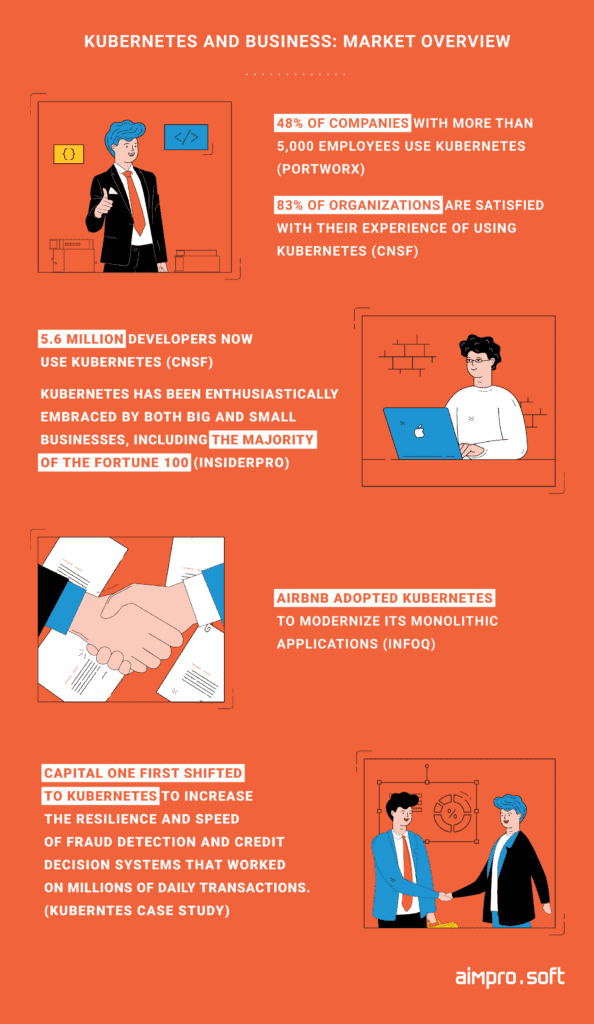
Kubernetes and business: market overview
Is Kubernetes for developers or DevOps specialists?
When you aim to hire a Kubernetes developer, one of the biggest challenges that can come on your way is to identify what type of professional you need. Do you need a DevOps expert with knowledge of Kubernetes or a software engineer with expertise in it, or maybe you need a Kubernetes consultant? Let’s try to figure this out.
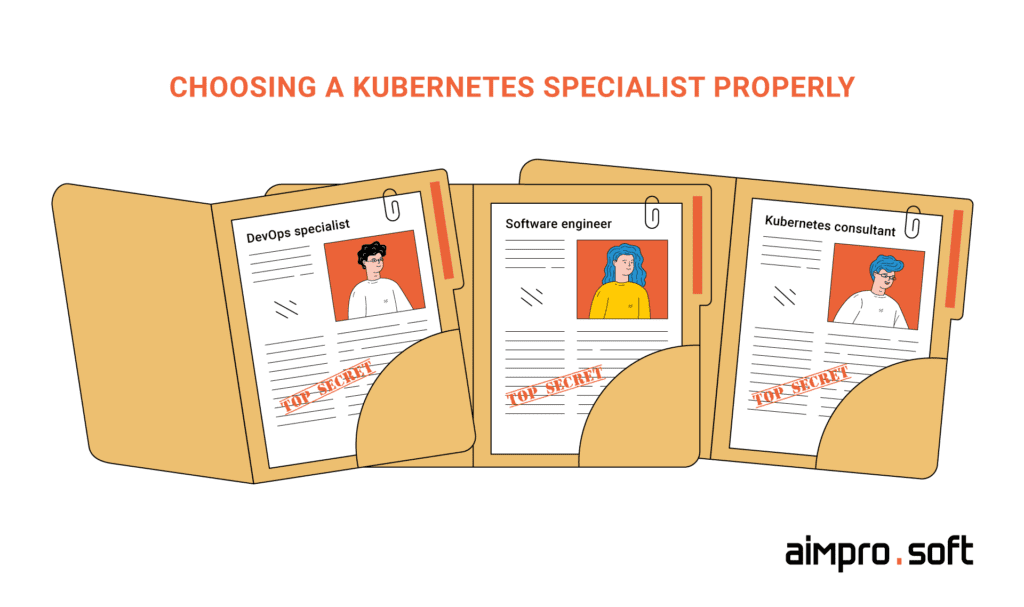
Types of Kubernetes specialists
DevOps specialists & Cluster administrators
DevOps specialists with knowledge of Kubernetes can be hired for the completion of various tasks. They know how to create Kubernetes cluster infrastructure from scratch, configure RBAC, add Kerberos, configure Ingress, load balancers, and much more. Such specialists know all the nuances related to Kubernetes configuration and, most importantly, enable security at various levels.
The primary objective of the DevOps engineer is to create the right conditions for the work of the developers and team, and ensure that everyone has strictly outlined and limited access to the resources (least privilege and resource limits). In turn, a cluster administrator (also known as a system administrator) is usually engaged in simpler tasks such as the set-up and configuration of the cluster.
So, what tasks should such specialists be hired for? DevOps engineer works together with the development team and has to be engaged from the very first stages of Kubernetes configuration. Such a specialist can complete various tasks, including app deployment to cluster, design of Helm charts, keeping the cluster continuously up-to-date, etc.
Software engineers with knowledge of Kubernetes
When it comes to software engineers, their knowledge and expertise in leveraging Kubernetes may not be so profound compared to DevOps experts. Yes, developers don’t have to be top experts in Kubernetes, but they need to be knowledgeable at those tools that can impact the performance of the solutions they create. There is a list of tasks where the participation of developers with knowledge of Kubernetes is necessary. For instance, they can create and configure deployments and stateful sets, and work with microservices and persistent volumes. Usually, backend developers are the ones that work with Kubernetes.
So, what tasks should such specialists be hired for? Once a DevOps specialist creates the infrastructure with prod, stage, and test cluster, sets roles and permissions, and configures security, a software engineer can come into play. The developer will continue working with a containerized application, create deployments and join them with services, and complete other tasks depending on their responsibilities on the project and expertise.
Kubernetes consultants
Finally, there are cases when you may require a Kubernetes consultant. For instance, you’ve never dealt with Kubernetes, have zero expertise in it, or have certain hesitations regarding the relevance of its usage in your case.
So, what tasks should such specialists be hired for? Such specialists may be required before the adoption of such technology in order to conduct an examination of your existing infrastructure, planning of the upcoming work, description of the scope of work, CI/CD planning, calculation of the expenses, etc.
As you can see, there are several types of specialists who can have knowledge of Kubernetes; however, each of them is required at a particular stage of product development, for the completion of different tasks, and their roles are not interchangeable. Mind this aspect when searching for Kubernetes engineers for hire.
Cases when hiring Kubernetes experts is recommended
The demand for Kubernetes experts is rapidly growing, which can be viewed from the study conducted by CNCF (Cloud Native Computing Foundation). According to the survey, from 2020 to 2021, the number of Kubernetes engineers grew by 67% to 3.9 million. And it’s not surprising if we consider the benefits that it can bring to business (i.e., automation of deployment, scalability, improved performance, and many others). However, there are certain scenarios when hiring Kubernetes experts is especially useful, including:
- When you need a container orchestrator to manage from dozens to thousands of containers.
- Perfect for solutions that need to be horizontally scalable, such as web apps.
- Can be used for the enhancements of big data apps (in this case, hiring Kubernetes experts is required by default).
- Enterprise-grade products that require scaling.
- Legacy applications that are shifting toward a microservices architecture.
- Applications that already leverage Docker (or similar solutions) for app containerization.
- Startups that need to avoid extensive expenditures on hosted solutions’ maintenance and enable flexibility for their growing ecosystems. The perfect timing for startups to adopt Kubernetes is once the MVP is developed, a product-market fit is found, and the functioning application is ready to be scaled.
However, it should be done before creating a system with a complex structure that may be challenging to migrate. However, the usage of Kubernetes isn’t relevant for all startups. Such specialists are rather expensive; hence their employment is justified only in those cases when you know that the app will need to handle an enormous amount of data or when you cannot scale vertically anymore.
Cases when hiring Kubernetes isn’t recommended
Yet, despite all the advantages that hiring Kubernetes professionals can bring to your businesses, there are scenarios when you simply don’t need such a specialist on board. The thing is that Kubernetes is created to solve certain problems and isn’t designed to fit any project and meet any business need. This is the type of solution that is complex in terms of configuration, needs high investments, and requires from a specialist a profound knowledge of cloud computing, container harnessing, containerized applications, and much more. Hence, let’s check such cases as well.
- If your app is monolithic. Kubernetes needs application containerization, which is basically the opposite of monolithic. Hence, if there is no need to refactor your product and containerize it, making an entirely new infrastructure for one application, then Kubernetes is not the solution in your case.
- Simple or small-scale projects. It’s simply expensive and complicated to leverage Kubernetes. Thus, this type of project doesn’t require such a tool.
- If your project won’t experience a high load and doesn’t have a complex microservices architecture, and drastic change in any of that isn’t expected any time soon.
Overall, Kubernetes is a powerful solution for managing containerized apps. However, its usage isn’t required for any type of project. There are cases when it can be more of a burden rather than salvation for business; hence it’s a must to make an initial assessment of the company’s needs, infrastructure, capabilities, and resources.
Contact us, and our experts will assist with the evaluation and help with Kubernetes integration.
CONTACT USSo, we’ve explored the type of specialists that are considered Kubernetes ones, reviewed when such technology should be leveraged, and in what cases it’s not the best option. Having formed a basic understanding of the topic, let’s move on to exploring the skills that you should be looking for when you are searching for Kubernetes experts for hire.
Technical expertise a Kubernetes developer should have
Explore the table below to identify how the skill set of a Kubernetes specialist varies depending on the qualification level (middle, senior). We haven’t included junior specialists since Kubernetes is the type of technology that requires profound expertise and knowledge. Moreover, when it comes to outsourcing this activity, you will need a skilled specialist that won’t need to be trained and will be able to solve tasks of any complexity without delays in work.
N.B. In the previous section, we examined that not only DevOps engineers can be knowledgeable in Kubernetes but developers as well. There are various types of developers who can have expertise in Kubernetes. Some of them have specialization in Python, others in Scala, and so on. We’ll demonstrate as an example the skill set that a specialist with knowledge of Kubernetes should have without mentioning any particular specialization, just those that are required to be able to work with containerized apps.
| Qualification level | Skill set |
|---|---|
| Middle | Understands how and when to use: Stateful Set, Deployment, Docker containerization, Services (ClusterIP, Headless Services, Node Port, and Load Balancers), Persistent Volume Claims, Config Map + deep knowledge of network structure and particularly Kubernetes network, knowledge of k8s cluster architecture and its main components, knowledge of using and configuring all objects of k8s API that are mentioned above, Helm, k8s troubleshooting. |
| Senior | Understands how and when to use: Ingress, Persistent Volume, Persistent Volume Claims, Storage Classes, RBAC, Secrets (they must be properly configured), a good understanding of security, a good understanding of all workloads (Job, CronJob, Stateful Set, Deployment), Helm (package manager for Kubernetes), Config Map. +ability to choose the tech stack correctly, build the CI/CD system for the product, build cluster monitoring and logging system, design k8s cluster capable of handling the high load, and the knowledge of specifics and difference of k8s service of main cloud providers (i.e., AWS, GCP, Azure). |
Mind that Kubernetes allows using various types of programming languages and frameworks, which makes it rather versatile and easier in terms of adoption. Moreover, Kubernetes is adopted by top cloud providers (i.e., AWS, Microsoft Azure, Google Cloud), making it, to a certain extent, simple to adjust in case you need to change your cloud provider. Having examined what technologies you should look for when you need to hire Kubernetes developers, it’s also important to examine other aspects that you should consider, namely soft skills.
Questions to check the skills and knowledge of a Kubernetes specialist
We gathered useful tips and a list of questions to ask from our Kubernetes specialists that we suggest applying when doing a technical interview. Test the specialist’s thought process when answering your questions, which should go beyond some concise answers without much reflection. Moreover, try to include questions from various categories, including simple theoretical ones, some general questions, and complex ones that don’t have some short and simple answers to them. We’ve composed a list below as an example of the mixture of such questions that can be asked during the interview.
- What are the different components of Kubernetes Architecture?
- What do you understand by Kube-proxy?
- What is the role of kube-apiserver and kube-scheduler?
- What are the different types of services in Kubernetes? (ClusterIP, NodePort, etc.)
- What is Ingress network, and how does it work?
- What is the difference between a replica set and a replication controller?
- What are federated clusters?
- What does it mean that “pods are ephemeral”?
- What happens when a master fails? What happens when a worker fails?
- Can you explain the relationship between container runtime and container orchestration?
- How do I build a High Availability (HA) cluster?
- Why do we need Headless services?
- How do you secure Secrets? Why are they not secure by default?
- Could you compare Kustomize to Helm?
Soft skills of a Kubernetes engineer you will gain with
The importance of soft skills constantly evokes debates in the IT community when it comes to tech experts. Some insist that soft skills can be neglected if you have spotted an extremely skilled specialist. Others claim that they are equally important to hard ones. We’ve gathered a list of soft skills that our tech experts consider vital and worth checking when hiring Kubernetes developers.
- Ability to work as a part of a team. Software development has always been a team sport. Hence, It’s highly important to ensure that a Kubernetes specialist can be a good team player, especially when you hire such an expert on a remote basis. This skill goes hand-in-hand with good communication skills. Make sure the hired professional knows to communicate with less tech-savvy experts such as BAs and PMs, and can translate tech language into a business one, can follow certain procedures, and knows how to make the entire team function like a properly-oiled machine.
- Curiosity. Cloud computing, containerized apps, and microservices are areas that are complex and continuously evolving. Thus, it’s critical for a Kubernetes specialist to constantly fulfill knowledge gaps, follow tech industry trends and changes, and keep up with Kubernetes-related updates. You don’t need a specialist who isn’t aware of recently released tools and methods that can potentially solve the problem emerged on your project.
- Problem-solving and accountability. Once again, we need to highlight that Kubernetes configuration is a rather complex thing to do. Hence, the specialist needs to be fast and efficient in terms of responding to certain obstacles and finding the right solutions. The developer has to be able to think outside the box and turn on critical thinking. Moreover, since mistakes happen even with highly skilled experts, it’s vital to take on accountability and learn to prevent similar problems in the future.
So, at this point, you have a clear image of who Kubernetes specialists are and what tech and soft skills they should have. Now it’s time to explore the hiring flow in detail.
6 steps on how to hire Kubernetes experts and build remote workflow smoothly
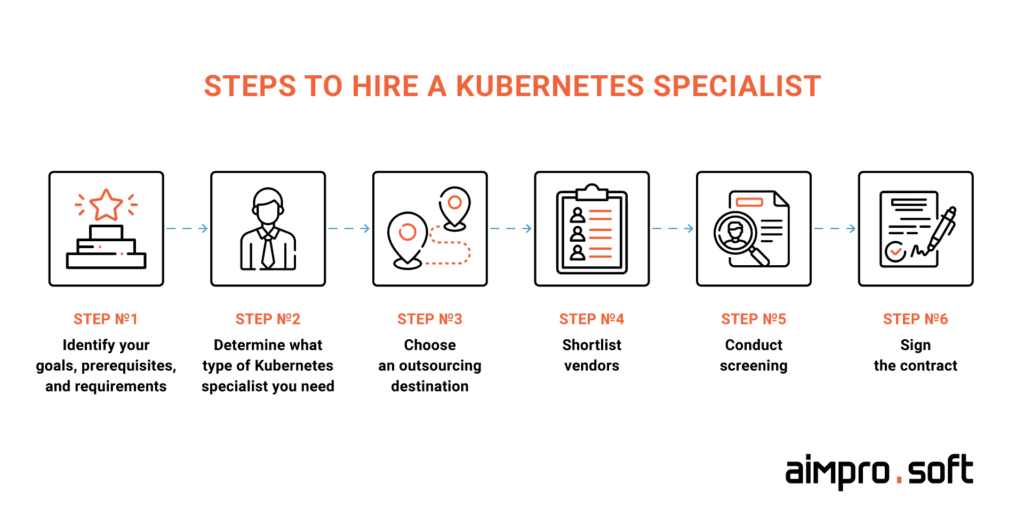
Step-by-step guide to hiring a Kubernetes specialist
Step 1: Identify your goals, prerequisites, and requirements
The adoption of Kubernetes is complex in terms of configuration and an expensive procedure in terms of hiring specialists. Hence, first and foremost, you have to conduct an initial analysis of your business needs, resources, and future objectives. As we already mentioned in one of the previous sections, you can turn to the assistance of a Kubernetes consultant who will help you with cost estimation and planning. Overall, you have to have clear answers to at least the following questions:
- Why is the hiring of a Kubernetes specialist necessary for your application?
- Is your infrastructure ready for Kubernetes adoption?
- Determine your budget so that you can know what type of employment model fits your financial resources.
- If you choose to hire a remote specialist, will you be able to manage processes efficiently?
- Do you have a specialist who will be able to assess the candidate’s skills properly?
Once you know what your objectives are and why you need to hire such specialists in the first place, time to move to identify what type of Kubernetes specialist you need to employ.
Step 2: Determine what type of Kubernetes specialist you need
We have figured out that there there are three primary types of Kubernetes professionals: software engineers, DevOps specialists, and Kubernetes consultants. You need to determine which one your project needs and at what stage. Secondly, you need to identify what tech stack such an expert should have and what experience. Look for professionals who have profound domain knowledge and expertise in completing tasks similar to the ones your project needs. All these aspects will help you identify a specialist’s profile which is basically a list of requirements and skills the person should have. This is important to shortlist candidates properly. One of the possible Kubernetes developer’s profiles can be seen in the image below.
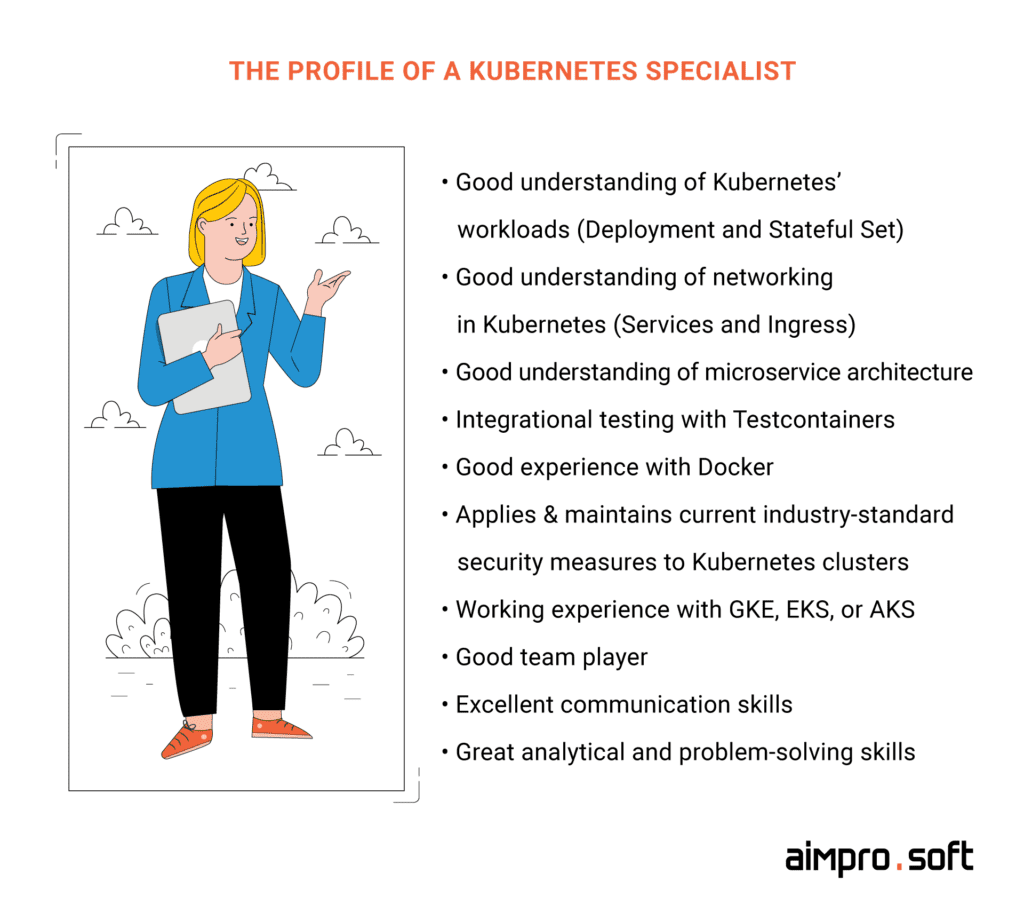
The profile of a Kubernetes specialist
Step 3: Choose an outsourcing destination
Since Kubernetes experts are quite expensive, numerous businesses choose to hire them in outsourcing or outstaffing agencies, depending on your needs. Although, both engagement models can be found in the same agency, just like at Aimprosoft. Businesses from countries with high salaries and hourly rates for Kubernetes specialists, such as the USA, England, Germany, Canada, Finland, Switzerland, etc., often opt for outsourcing to Eastern European countries (e.g., Ukraine, Poland, Estonia), Latin American countries (e.g., Brazil), the Philippines, China, and Singapore.
When choosing an outsourcing destination, consider the following parameters to make the right choice:
- convenient time zone;
- the region should have a good reputation;
- IT sector should be highly developed (constant flow of investments, a high number of developers and IT companies, various R&D centers, etc.);
- English language proficiency should be high;
- low rates of security problems;
- proper balance between quality of work and hourly rates.
Once you decide which outsourcing destination meets your requirements, you can start shortlisting vendors to start the hiring process.
Step 4: Shortlist vendors
When you aim to hire a Kubernetes specialist, the option to find an agency that provides managed Kubernetes services is more cost-saving than investing in employing and retaining an in-house expert and more secure than the option of hiring a freelancer. The main benefits of choosing Kubernetes managed services are:
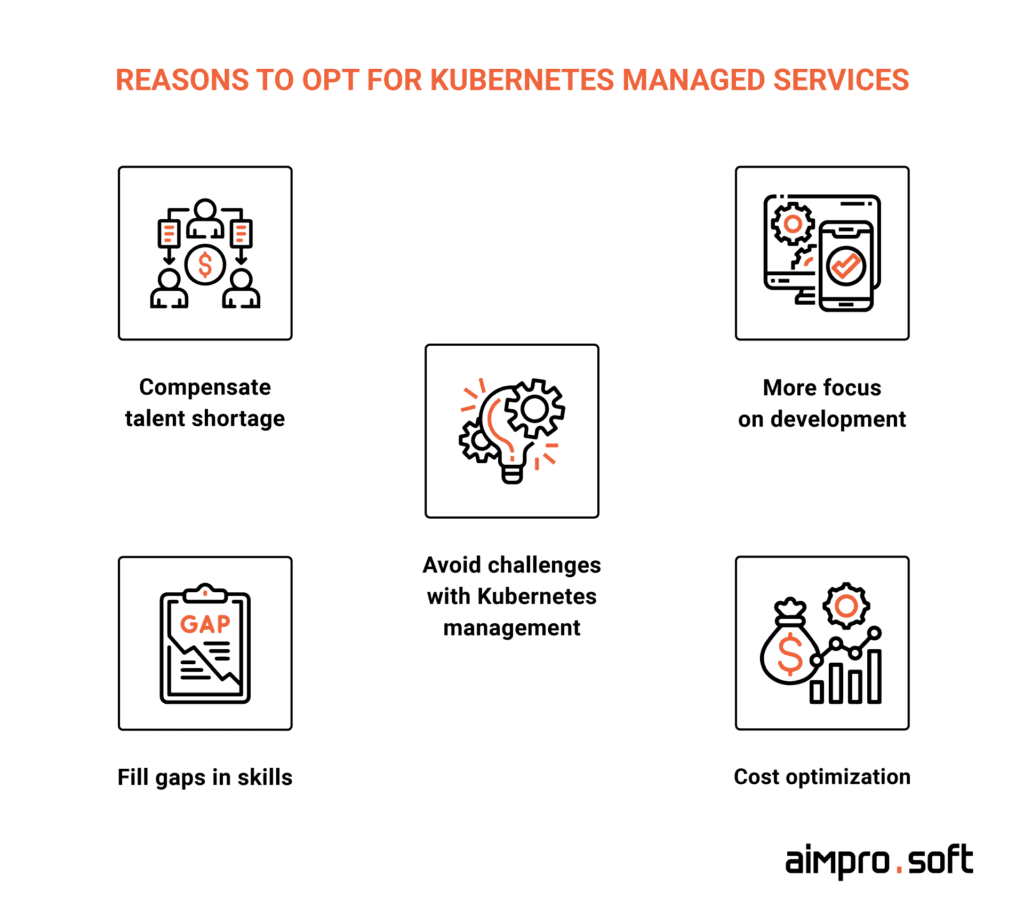
Reasons to choose Kubernetes managed services
Shortlisting IT companies should be as meticulous as you’ve been choosing the outsourcing destination. However, the list of aspects to consider will be slightly different in order not to stumble upon an unreliable company. Make sure you mind the following parameters:
- identify whether the company has expertise in your niche;
- check the company’s portfolio, paying attention to similar cases;
- make sure you check feedback left by previous clients;
- figure out how the company approaches security;
- learn how the vendor offers you to manage remote employees and what task and time management tools the company uses.
In addition to the aspects mentioned above, we recommend checking the company’s profile via independent review platforms, such as Clutch, TechBehemoths, etc. They will help you view the previous client’s feedback, check out the company’s services, and learn other necessary info.
Step 5: Conduct screening
Once you’ve chosen the IT vendor to start a collaboration with, decided on the employment model, and have begun gathering resumes from the company, you should do the candidate screening to see whether the developer is the right fit for your project. The advantage of screening is that it guarantees a candidate satisfies all criteria for the position of a Kubernetes specialist, including abilities, years of experience, the kinds of projects they have completed, certifications, and English language competence.
At this stage, if a candidate doesn’t fit those essential requirements, you can safely dismiss them. Once you’ve chosen the candidate, it’s time to schedule an HR and tech interview. Follow the recommendations that we’ve provided in the section regarding the soft and tech skills of such candidates; they will help you to select the right one for your project.
Step 6: Sign the contract
Once you coordinate with the vendor all the details regarding your cooperation, such as payment model, security measures, project management process, and so on, you can proceed to signing the contract. Make sure it covers all legal matters, including NDA conditions, the deliverables you expect to obtain, payments schedule, predetermined rates, delivery schedule, and other key aspects that can protect you from an unexpected outcome and any possible risks.
Drop us a line, and we’ll examine your request and offer the best-fit specialist for a fair rate.
CONTACT USWhy hire a Kubernetes specialist at Aimprosoft, and how does this work?
Collaboration with a third-party IT vendor presupposes a certain level of risk. You may stumble upon an unreliable company, one that fails to prove claimed expertise, or one that carelessly approaches the protection of the client’s data. For more than 17 years, we’ve been meticulously forming our reputation and establishing a firm position in the market. Approximately 80% of our clients converted into loyal ones after our initial collaboration and turned to us for the development of their other projects. Below we provide some compelling arguments that should prove why it’s worthwhile to turn to Aimprosoft for Kubernetes developers for hire.
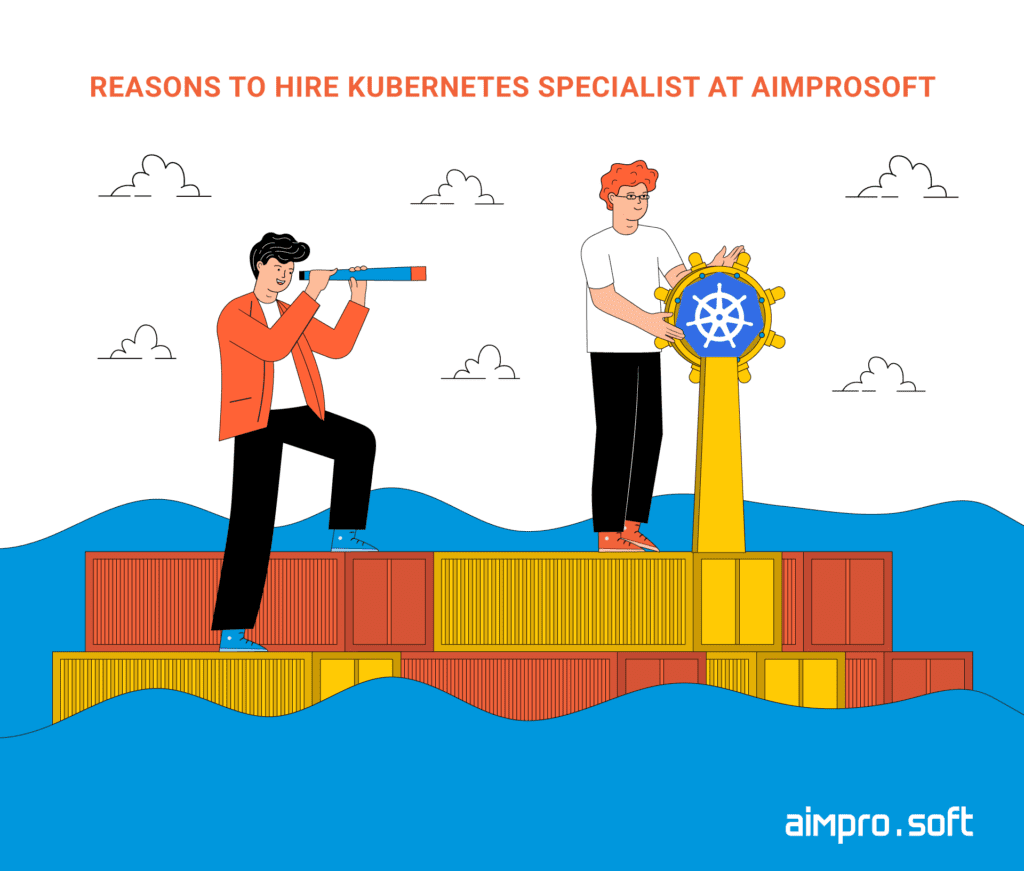
Reasons to hire Kubernetes developers at Aimprosoft
We beat words with numbers
We think that numbers speak louder than words when it comes to proving the company’s credibility and trustworthiness. Here is a short list of numbers that we can boast of so you can have a clear image picture of Aimprosoft.
- There are more than 600 completed projects in our portfolio of a different grade and complexity, from startups to enterprise-grade ones, from short-time projects to those that last several years and continued to be maintained by us.
- We have more than 350 different specialists, which allows us to provide full-cycle development services and assemble an entire team depending on the needs of your project.
- 100+ clients from all over the world.
- Our client retention rate in 2022 is 100%.
- We have experience in developing a product for more than 24 domains.
Skills, capabilities, expertise
You can hire DevOps engineers who have profound expertise in Kubernetes configuration as well as developers specializing in various directions (Scala, Python, Java, etc.) and with the knowledge of Kubernetes at Aimprosoft. In the table below, you can explore a tech stack that our DevOps Kubernetes specialists are knowledgeable at.
| Category | Technologies |
|---|---|
| Cloud | Amazon Web Services, Azure, Google Cloud |
| Version control | Git |
| Container orchestration | Kubernetes, Amazon ECS, Hashicorp Nomad |
| CI/CD | Jenkins, GitHub Actions, GitLab CI/CD, CircleCI, Argo CD, Azure DevOps, AWS Code |
| Automation | Ansible, Vagrant, Packer |
| IaC | Terraform, CDK, AWS CloudFormation, Pulumi |
| Monitoring and logging | New Relic, AWS CloudWatch, Azure Monitor, dataDog, Prometheus, Grafana, Elasticsearch, Splunk, Opentelemetry |
| Code quality and code security | SonaQube, Veracode, Clair |
In turn, the capabilities of our developers include the following list of the services that we provide:
- Creation of Docker files and Kubernetes files to deploy services;
- Creation of a Kubernetes cluster and deploying services there;
- K8S cloud platform deployment;
- Creation of application landscape manifests (i.e., Kube Manifests, HELM charts);
- Management of CI/CD pipelines;
- Management of dev tools;
- Observability;
- Logging;
- Support of the deployment;
- Building and support of Kubernetes platforms;
- Security;
- Automation of the platforms;
- Deployment and maintenance of created services.
Stability is our second name
The stability of our work was first challenged at the start of the pandemic, which made us adjust our working processes to the remote regime. The second time our company had to reorganize the entire workflow due to the start of the war. We relocated our office to Ivano-Frankivsk (a safe region in the western part of Ukraine) and equipped it with everything necessary for continuous delivery, including generators and a Starlink kit. Currently, correctly taken measures and installed equipment allow us to sustain a seamless workflow, providing services to our clients in an interrupted way.
Finally, if the arguments mentioned above were compelling enough to consider Aimprosoft as your trusted IT vendor, the start of our cooperation will look the following way:
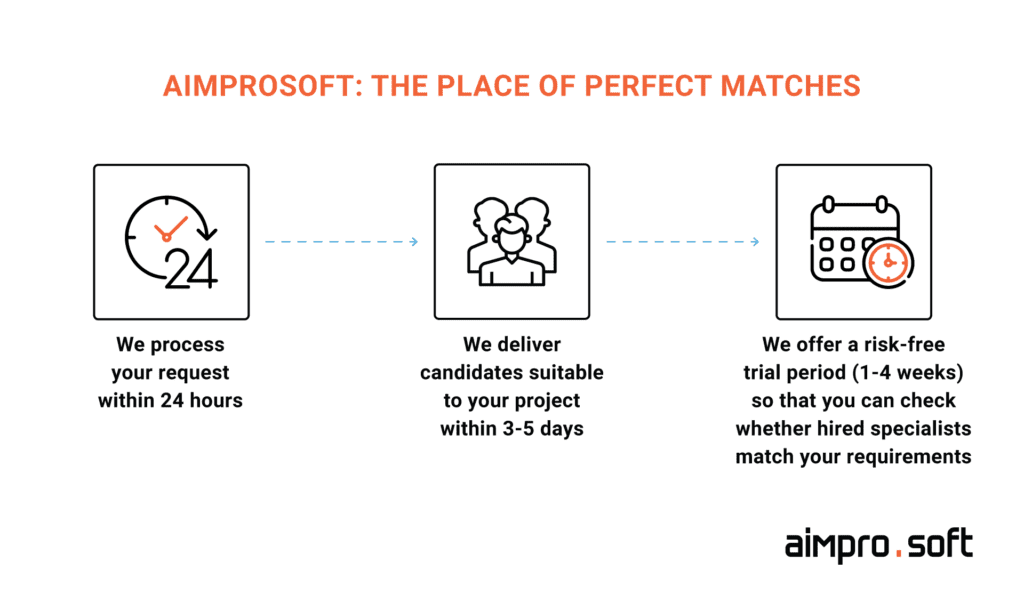
Cooperation with Aimprosoft
Conclusion
Overall, Kubernetes is the best-fit solution for growing businesses that need scalability, acceleration of development, release, and deployment processes, and optimization of IT costs. Nevertheless, despite its impressive advantages, Kubernetes configuration requires effort, a well-planned strategy of the technology adoption, and a specialist with a profound skill set and expertise. By following our guide and applying mentioned best practices, you can easily find the right specialist for your project. However, if you want to have guaranteed success when you hire a Kubernetes expert, contact us, and we’ll make sure that your business can easily benefit from this future-proof orchestration platform.
Are Aimprosoft Kubernetes developers different from the freelancers’ pool of talents?
Aimprosoft Kubernetes developers are different from freelancers in a few aspects; namely, they have vast expertise in developing products for different domains, they know how to work as a part of a team and translate tech language into a business one, and they have experience in delivering projects of various complexity, from startups to enterprise-grade ones. Moreover, we have a pool of Kubernetes specialists who are DevOps experts as well as software engineers specializing in Python, Scala, Java, and other directions.
How much does it cost to hire Kubernetes developers, and what affects it?
The cost of Kubernetes specialists is formed based on several factors: location, expertise, qualification level, and engagement model that you will choose. For instance, if you decide to hire an in-house mid-level Kubernetes expert, let’s say, from the USA, it will cost you $. In turn, if you will opt for a freelance model, the specialists with the same level of expertise will cost you $60-80 per hour. Finally, if you will go with outstaffing and choose to collaborate with an offshore software vendor somewhere from Eastern Europe (e.g., Ukraine), which is considered a popular destination to hire a Kubernetes engineer from, you will pay approximately $40 per hour.
The prices vary drastically. Thus, it’s important to identify beforehand your budget limits, capabilities to retain on-site specialists, knowledge of working with remote experts, and so on. Once you have a clear image of your capabilities and resources, you can consider what type of employment suits you most, conduct research, and proceed to a hiring process.
What are Kubernetes alternatives?
Although Kubernetes is considered one of the most efficient orchestration platforms and favorite among businesses, there is a number of great alternatives as well. According to our DevOps engineer, some of the alternatives to Kubernetes are Heroku, Vagrant, Portainer, Rancher, Nomad, DockerSwar, and Mesos.
How do you manage remote developers?
Thanks to the pandemic and current situation in Ukraine, we acquired priceless experience in managing remote teams that we converted into working best practices. Hence, we advise creating a remote employee management strategy that will include a number of standardized processes that have to be followed and management tools that will be used. Secondly, it’s a must to use task management systems that will simplify task status monitoring, issues tracking, etc.




